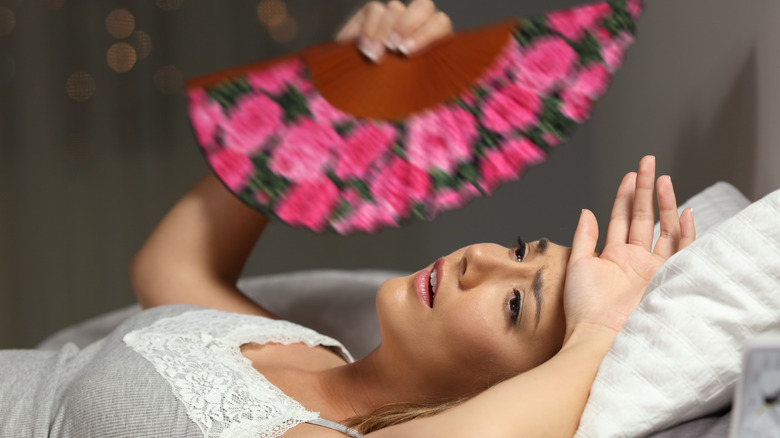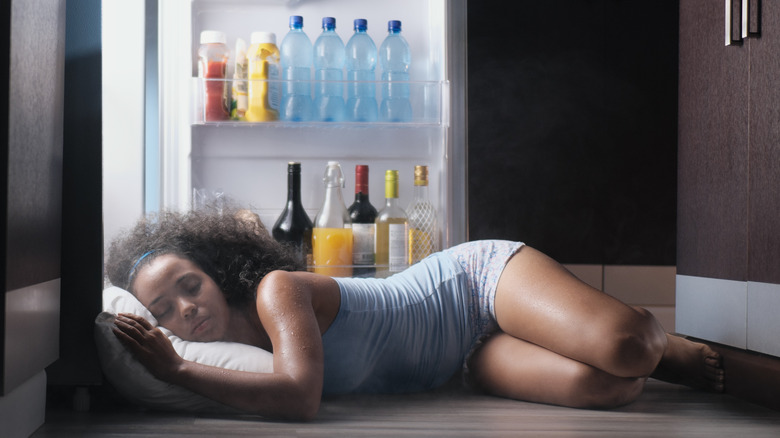Night Sweats Vs. Hot Flashes: Which One Causes Women More Stress?
Despite the fact that menopause is still considered a taboo subject, almost every person with ovaries will go through it eventually (via Health Partners). Although exactly when can vary from person to person — some people being as young as in their 30s — the average age at which menopause hits is 51 in the United States (via Mayo Clinic). And, when it does hit, it's not without its side effects that can throw one's life into a hormonal and emotional whirlwind.
But while menopause is a part of life, as a culture, we don't give enough attention to it or the side effects that come with it. For starters, our culture isn't too keen on talking about sexual health, in general. "There are a lot of barriers to talking about menopause," women's health expert and clinical professor at Yale University School of Medicine's Department of Obstetrics, Gynecology, and Reproductive Sciences, Dr. Mary Jane Minkin, tells Healthy Women. "You couldn't call a vagina a vagina on TV until very recently! The other issue with menopause is that we go through menopause as we get older, we're not supposed to get old, because getting old is [considered] a bad thing."
Bad thing or not, menopause is a fact, as are the symptoms that come with it. Although the side effect that gets the most attention are the hot flashes, it's actually not the one that causes the most stress.
Hot flashes versus night sweats
A recent study of 200 women posed the question of which menopausal symptom is most stressful: hot flashes or night sweats. The study found, overwhelmingly, that night sweats have a greater impact on one's mental and physical health than hot flashes (via The North American Menopause Society). "We know that sleep disturbances are one of the biggest detriments for women going through menopause, but these results are unique because they show that women experiencing night sweats, rather than just hot flashes, may be at an even bigger disadvantage," the study's author Sofiya Shreyer said.
Although hot flashes and night sweats may sound like the same thing, they're not. The big difference is that hot flashes are not always accompanied by sweating, whereas night sweats, as the term suggests, is perspiring when you should be sleeping (via Healthline). It's hard to get a good night's sleep when the hormones surging through your body refuse to let you stay dry.
Why night sweats are worse for many
Not only do night sweats not allow someone to get the necessary amount of shut-eye we all need to feel good and be productive, but the same study found that they're also linked to higher levels of depression and stress.
"This study adds to the growing evidence that menopause symptoms such as hot flashes and night sweats can significantly detract from a woman's qualify of life and should be taken seriously by healthcare professionals," NAMS medical director, Dr. Stephanie Faubion, said in The North American Menopause Society's press release.
Another recent study by the American Academy of Neurology published in Neurology found that night sweats increase white matter hyperintensity volumes (WMHV) in the brain by 6%. These small lesions are linked to higher chances of strokes, cognitive decline, and the possible onset of Alzheimer's disease.
"We previously thought the symptoms of menopause were just a benign rite of passage in a woman's life — this may disprove that," co-director of NYU Langone's Concussion Center and director of cognitive neurology at NYU Langone Hospital—Long Island, Dr. Shae Datta, tells Healthline. "Previous research showed us that menopause causes worsening of cardiovascular health during menopause. Since cardiovascular health is closely tied to brain health, this study may give us more clues into brain health after menopause."
While the study by the American Academy of Neurology and University of Massachusetts did stress that these findings are important to understanding menopause more, the studies' authors admitted there was still more research to do on the topic.


